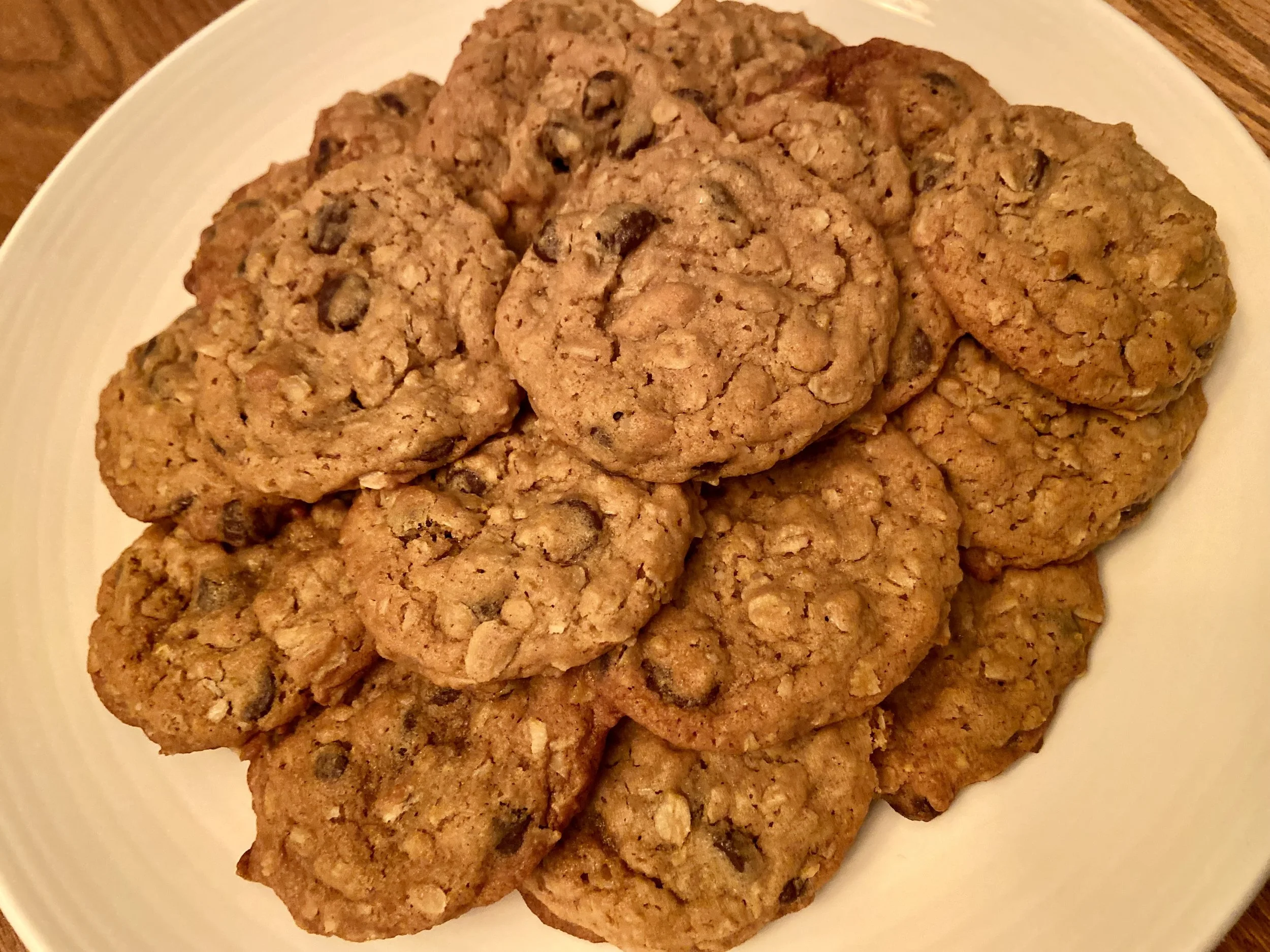“Smart Swaps” Oatmeal Chocolate Chip Cookies
Let me level with you. I didn’t alter the laws of thermodynamics and turn cookies into a health food. These cookies are delicious, and while healthier than ordinary cookies, only slightly. With a couple of “smart swaps”, you can make this treat food a bit healthier, and those small changes can add up.
What are the “smart swaps”?
We’re going to reduce the amount of butter by a third and replace it with avocado oil. Why not swap more of the butter for avocado oil if it is healthier? Because if you swap more than that, it changes the texture of the cookie dough and your cookies won’t end up delicious. A “smart swap” is one that isn’t noticeable in the flavour of the cookie. We are aiming for delicious and slightly healthier cookies. This swap will reduce the saturated fat in the recipe and replace it with some monounsaturated and polyunsaturated fat. Eating too much saturated fat can raise your LDL cholesterol and put you at risk for cardiovascular illness. Certain MS diets recommend reducing your saturated fat intake (for example, the Swank diet or the Overcoming MS diet).
We’re going to swap 1/4 cup of sugar for 1/4 cup of molasses. Molasses is a byproduct of making sugar, and it contains more vitamins and minerals than sugar, including iron, selenium, copper, manganese, magnesium, potassium, calcium, and vitamin B6. Once again, we don’t want to overdo it on the molasses, because it will change the flavour of the cookies if you swap too much sugar for molasses.
We’re going to use a 50/50 mix of regular all purpose flour and whole wheat all purpose flour. If you want to swap all of the flour to whole wheat, you can. However, this will create a more dense, nutty-tasting cookie. It will also bake a bit darker in colour. I use a 50/50 mix because it has a closer flavour to a traditional cookie. As I said above, a “smart swap” should be noticeable to the nutrition, but unnoticeable to the taste of the cookie. This swap will increase the fibre content of your cookies. Fibre is important in preventing constipation, regulating blood sugar, and maintaining a healthy gut microbiome. Whole wheat flour is also rich in several B vitamins, as well as iron and calcium. This swap will also bump up the protein content ever so slightly.
Finally, we’re going to use dark chocolate chips instead of semi-sweet or milk chocolate chips. The higher cocoa content in dark chocolate delivers more antioxidants and minerals than its semi-sweet or milk chocolate counterparts.
Like I said, these “smart swaps” aren’t anything Earth-shattering. They won’t magically transform your dessert into a health food. They will, however, bump up the nutritional value of the cookies without taking anything away from the flavour.
Ingredients:
1.5 cups rolled oats
3/4 cup all purpose flour
3/4 cup whole wheat all purpose flour
1/2 tsp baking soda
1/4 tsp ground cinnamon
1/4 tsp ground nutmeg
1/2 cup salted butter (Note: if you use unsalted butter, add 1/4 tsp salt to the recipe; I use salted butter because I would rather have leftover salted butter)
1 cup sugar
1/4 cup avocado oil
1/4 cup fancy molasses
tsp vanilla extract
1 egg
1 cup dark chocolate chips
Instructions:
Preheat oven to 375 degrees Celsius
Mix the oats, flours, baking soda, cinnamon, and nutmeg together in a large bowl. Set aside.
Cream the butter and sugar together using a stand mixer or beaters. Add the avocado oil, molasses, vanilla, and egg and mix until well incorporated. Add the dry ingredient mixture to the wet ingredient mixture and stir until just incorporated (avoid over mixing). Add the chocolate chips to the dough and stir until the chocolate chips are evenly distributed in the dough.
Using a medium cookie scoop or spoon, portion approximately 1.5 tbsp of dough per cookie onto a parchment-lined baking tray. Bake for 13 minutes.
Nutrition per serving (makes 36 servings):
136 calories
6.9g fat
1.9g protein
1.3g fibre
